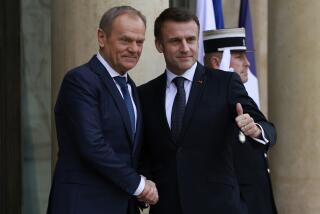European Leaders Seek Formation of Defense Giants
- Share via
The leaders of France, Britain and Germany jointly urged their defense industries Tuesday to adopt by March 31 a “clear plan” to create giant, Pan-European companies that could compete with U.S. rivals.
Prime Minister Tony Blair of Britain, President Jacques Chirac of France and Chancellor Helmut Kohl of Germany urged companies to cut through bickering over leadership and ownership as defense rivals across the Atlantic put in place the final pieces of a consolidation that has created three industry giants.
While European leaders regularly have insisted the industry merge to survive in a market that shrank after the end of the Cold War in the late 1980s, this is the first time they have done so with one voice.
That reflects increasing concern that as Europe’s defense companies argue about how best to consolidate, they will be picked off one-by-one by Boeing Co., Lockheed Martin Corp. and Hughes Raytheon of the U.S.--becoming partners or mere subcontractors.
“If the governments don’t do something” to force consolidation, “the outcome will be as the Americans are suggesting: there’ll be a lot of American dominance” of European companies, said Ann Markusen, a senior fellow for industrial policy at the U.S. Council on Foreign Relations.
Markusen was in Paris to speak at a conference on cooperation and competition among European and U.S. defense companies. She made the comment in an interview.
Government attempts to force mergers come as the French, German, British and Spanish partners in Airbus Industrie, the maker of commercial jetliners that rivals Boeing, pursue talks to transform the loosely structured partnership into a company by 1999. Airbus will serve as a platform, the leaders said, and eventually will take in the military-aircraft businesses of its partners.
“France, Germany and the U.K. share a vital political and economic interest in an efficient and globally competitive European aerospace and defense electronics industry,” the three leaders said. “This will help to improve Europe’s position in the global market, to promote European security and ensure that Europe will play a full role in its own defense.”
This is hardly the first time government or industrial leaders in Europe have expressed that wish. For years, there’s been active discussion of how to bring together companies that in some cases are regarded as central to national security. And since June, industry and governments have been talking about accomplishing that by using Airbus as a model for Pan-European consolidation of everything from helicopters to missiles to tanks.
Europeans have long cooperated on individual projects. The Eurofighter, for example, is a joint German-British-Italian-Spanish project to build a new generation of fighter aircraft involving Daimler-Benz Aerospace; British Aerospace; Italy’s Alenia and Spain’s Casa.
In the last few years, several joint companies have been formed. Aerospatiale and Daimler-Benz merged their helicopter businesses to create Eurocopter in 1993. And Lagardere’s Matra and British Aerospace merged their missile operations in 1996, forming Matra BAe Dynamics.
European leaders, however, want to go further than single-project cooperation or joint ventures in narrow areas--they want to match the might of U.S. rivals.
Lockheed Martin, formed in the 1995 merger of Lockheed Corp. and Martin Marietta Corp., has annual sales of about $37 billion--and that is before completing its planned purchase of Northrop Grumman Corp. Boeing has total civil and military sales of about $48 billion. BAe’s sales, by contrast, are around $12.3 billion.
The European leaders are also for the first time setting a timetable. Their call follows recent visits to Britain by Kohl and Chirac, where defense issues were high on the agenda, British officials said.
“We welcome the fact that a number of European companies, including Daimler-Benz Aerospace, Aerospatiale and British Aerospace, have already demonstrated their intention to regroup their activities,” the leaders said. “We ask that they should present a clear plan and detailed timetable for this restructuring and integration by March 31, 1998.”
Industry analysts said the statement could prod companies into action.
“It’s a good starting point -- it gets people thinking and it gives people a theme,” said Chris Partridge, associate director of aerospace finance at Deutsche Morgan Grenfell in London. “It makes sense, but what will actually come of any agglomeration in Europe is very hard to say as of yet.”
More to Read
Inside the business of entertainment
The Wide Shot brings you news, analysis and insights on everything from streaming wars to production — and what it all means for the future.
You may occasionally receive promotional content from the Los Angeles Times.










